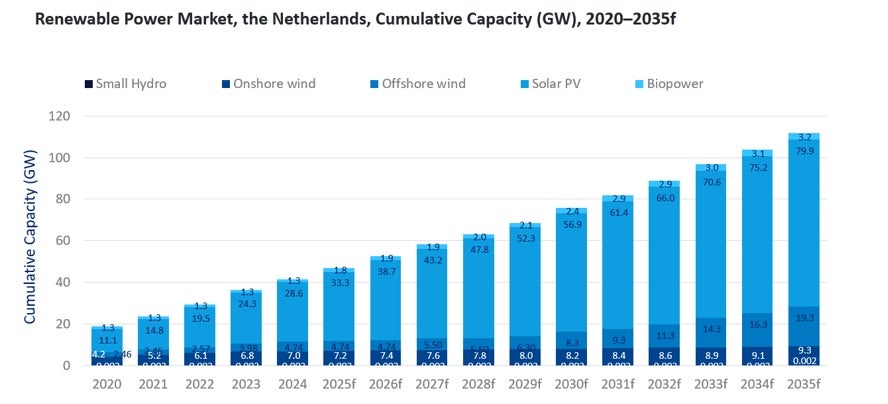Leading data and analytics company GlobalData’s latest report, ‘Netherlands Power Market Trends and Analysis by Capacity, Generation, Transmission, Distribution, Regulations, Key Players and Forecast to 2035‘, provides comprehensive insights into the country’s evolving power landscape. The study covers installed capacity (gigawatts), generation (terawatt-hours), technology mix, and regulatory developments across the historical period (2020-24) and forecast period (2025-2035). It also evaluates market drivers, challenges, investment opportunities, and key company profiles. The analysis draws on GlobalData’s proprietary databases, primary and secondary research, and in-house expertise.
The Netherlands is accelerating its clean energy transition with rapid growth in solar photovoltiac (PV) and wind, supported by EU-aligned policies, grid expansion, and flexibility initiatives. The country’s total renewable power capacity is forecast to reach 111.7GW by 2035, up from 41.6GW in 2024, registering a compound annual growth rate (CAGR) of 9.4% during 2024-2035.
Supportive policy measures such as the SDE++ programme, the National Energy and Climate Plan, and the Offshore Wind Roadmap 2030-2050 are catalysing renewable deployment. Large-scale grid infrastructure projects under TenneT’s reinforcement programme and the National Grid Congestion Action Programme are addressing bottlenecks, enabling new capacity integration. Meanwhile, the government’s hydrogen strategy, targeting 3-4GW of electrolysis capacity by 2030, and growing investments in battery storage projects are set to strengthen system flexibility and resilience.
On the conventional front, coal is being phased out completely by 2028, well ahead of the 2030 deadline, while natural gas will remain a key balancing source at around 20GW through 2035. Nuclear capacity will remain steady at 0.4GW (Borssele), with life-extension under consideration and plans for two new reactors advancing as part of the country’s long-term low-carbon diversification strategy. However, challenges persist, including grid congestion, rising network tariffs, and permitting delays, which could affect project delivery timelines. Accelerating storage deployment and improving spatial coordination for wind and solar projects will be crucial to sustaining the momentum of renewable expansion. The Netherlands’ clean energy outlook remains highly positive, underpinned by strong policy support, grid modernisation, and investment in flexibility technologies. As solar PV and wind power continue to dominate growth, the country is firmly positioned to strengthen its renewable base and advance towards a climate-neutral power system by 2050.

US Tariffs are shifting - will you react or anticipate?
Don’t let policy changes catch you off guard. Stay proactive with real-time data and expert analysis.
By GlobalData





